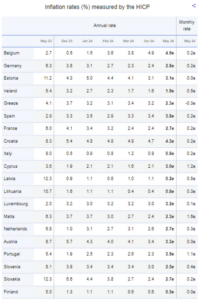In Greece, the harmonized inflation rate dropped significantly to 2.3% in May, from 3.2% in April, reaching its lowest level since September 2021.
In the Eurozone, harmonized inflation rose to 2.6% in May, from 2.4% in April, according to Eurostat’s preliminary data.
This is the first time since September that Greece has had lower inflation than the Eurozone.
It is worth noting that Greece was the only country that showed a monthly decrease, with the index at -0.3%.

The remains of eight more missing Greek soldiers fallen in Cyprus have returned to Greece (photos)
In April, inflation decreased in Greece to 3.2% from 3.4% in March, while it remained unchanged at 2.4% in the Eurozone.
Regarding the main components of inflation in the euro area, services are expected to have the highest annual rate in May (4.1%, compared to 3.7% in April), followed by food, alcohol, and tobacco (2.6%, compared to 2.8% in April), non-energy industrial goods (0.8%, compared to 0.9% in April), and energy (0.3%, compared to -0.6% in April).
In the face of the first interest rate cut by the ECB after two years
It is worth noting that, barring any dramatic changes, the ECB will have full freedom to proceed with the first interest rate reduction on June 6th after 2 years and 10 consecutive increases, which have raised the central bank’s intervention rate to 4.75%. A decrease of 25 basis points is expected. However, analysts estimate that the data to be announced will not affect the ECB’s decision to reduce interest rates on June 6th.
The first interest rate hike by the ECB took place on July 27, 2022, raising the interest rate from 0.25% to 0.75%, while the last one occurred on September 20, 2023, raising the interest rate from 4.5% to 4.75%.
Ask me anything
Explore related questions





